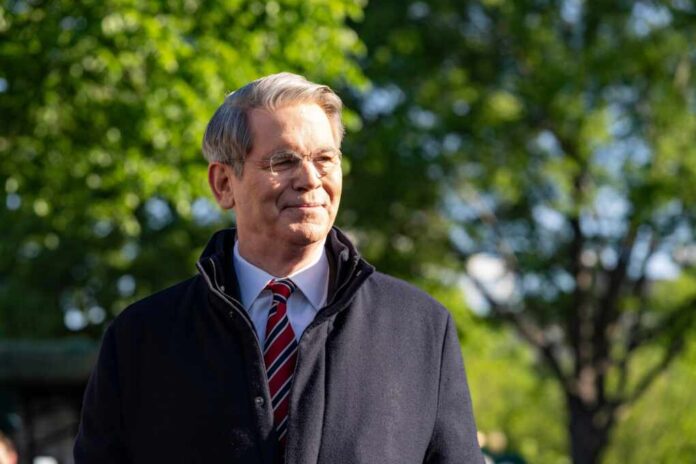
Scott Bessent’s nomination as Treasury Secretary marks a significant departure from Janet Yellen’s tenure, promising a bold shift in economic policy under President Trump’s administration.
At a Glance
- Scott Bessent has been nominated by President Trump as the new Treasury Secretary.
- Bessent is known for his support of Trump’s economic policies, including tariffs and spending cuts.
- His nomination represents a shift from academic economic leadership to a hedge fund executive.
- Bessent’s views challenge mainstream economic opinions, especially regarding tariffs and inflation.
A New Chapter in Treasury Leadership
Scott Bessent, a hedge fund executive with a robust background in macroeconomic risk analysis, has been nominated as the U.S. Treasury Secretary by President Trump. This nomination comes after Janet Yellen’s tenure, where she was recognized for her labor economist background and for leading both the Federal Reserve and the Treasury. Bessent’s selection signals a clear shift towards Trump-aligned economic policies, including the controversial use of tariffs and a focus on spending cuts.
Watch: US Treasury Secretary Scott Bessent speaks in Japan
Bessent’s career includes a notable stint as the chief investment officer at Soros Fund Management, where he gained substantial experience in financial markets and investment management. His views often challenge mainstream economists, particularly his belief that tariffs do not necessarily lead to inflation—a statement that has sparked debate among economic scholars and practitioners alike.
Key Stakeholders and Their Roles
The shift from Janet Yellen to Scott Bessent involves several key stakeholders. Bessent himself, upon Senate confirmation, will have a direct influence on U.S. economic policy. His nomination is a strategic move by President Trump, who continues to steer the country’s economic policies towards protectionism and fiscal conservatism. The U.S. Senate holds the power to approve or block Bessent’s appointment, and their decision will be critical in shaping the Treasury Department’s direction.
The transition will also impact the U.S. Department of the Treasury, where staff will need to adapt to new leadership and priorities. Financial markets and investors are closely watching these developments, as changes in policy can affect market stability and investment strategies. Economic policy advisors will compete to influence the administration’s stance on key issues such as tariffs and government spending.
Potential Impact and Future Outlook
The implications of Bessent’s appointment are far-reaching. In the short term, we can expect an immediate pivot towards Trump’s economic policies, with potential increases in tariffs and reductions in government spending. The financial markets may experience turbulence as they adjust to the new policy direction. In the long term, the reorientation of U.S. trade and fiscal policy could lead to a focus on protectionism and reduced government involvement in economic affairs.
The Treasury Department itself may undergo changes in leadership style and priorities, affecting the internal culture and operations. Consumers and businesses might face new challenges related to tariffs and trade policies, while federal agencies like the IRS may need to align with new directives. International economic relations could also shift as the U.S. redefines its trade and monetary policies under Bessent’s leadership.

























